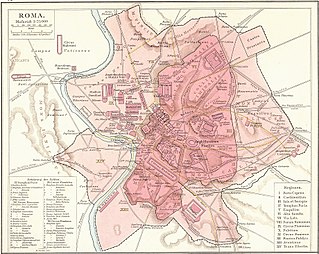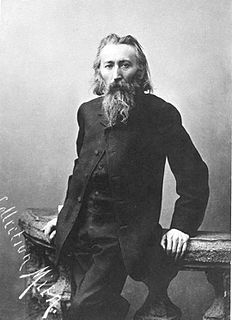Related Research Articles

The Domus Aurea was a vast landscaped palace built by the Emperor Nero in the heart of ancient Rome after the great fire in 64 AD had destroyed a large part of the city and the aristocratic villas on the Palatine Hill.

Jan Alojzy Matejko was a Polish painter known for paintings of notable historical Polish political and military events. His works include large oil on canvas paintings like Rejtan (1866), Union of Lublin (1869) or Battle of Grunwald (1878), numerous portraits, a gallery of Polish kings, and murals in St. Mary's Basilica, Kraków. He is referred to as the most famous Polish painter or even the "national painter" of Poland.

Domus de Janas are a type of pre-Nuragic chamber tombs found in Sardinia. They consist of several chambers quarried out by the people of the San Ciriaco through Ozieri cultures and subsequent cultures, resembling houses in their layout.
In ancient Rome, the domus was the type of house occupied by the upper classes and some wealthy freedmen during the Republican and Imperial eras. It was found in almost all the major cities throughout the Roman territories. The modern English word domestic comes from Latin domesticus, which is derived from the word domus. The word dom in modern Slavic languages means "home" and is a cognate of the Latin word, going back to Proto-Indo-European. Along with a domus in the city, many of the richest families of ancient Rome also owned a separate country house known as a villa. Many chose to live primarily, or even exclusively, in their villas; these homes were generally much grander in scale and on larger acres of land due to more space outside the walled and fortified city.

Roberto Cavalli is an Italian fashion designer and inventor. He is known for exotic prints and for creating the sand-blasted look for jeans. The high-end Italian fashion house Roberto Cavalli sells luxury clothing, perfume and leather accessories. Former Acne Studios creative consultant Paul Surridge succeeded Peter Dundas as creative director for the brand in May 2017.
The papal household or pontifical household, called until 1968 the Papal Court, consists of dignitaries who assist the pope in carrying out particular ceremonies of either a religious or a civil character.

Lost: Via Domus is a video game based on the ABC television series Lost. The game was released for the Microsoft Windows operating system, and the Xbox 360 and PlayStation 3 video game consoles in February 2008, after the third season of the series. In Via Domus, players control Elliott Maslow, a survivor of the plane crash that Lost revolves around. Although Elliott is not featured on the series, the game contains many characters from the show, as well as many locations from Lost's mysterious island. Some of the original cast of the series provided the voices for their characters, and the Lost composer Michael Giacchino created the score for the game.

Domus de Maria is a comune (municipality) in the Province of South Sardinia in the Italian region Sardinia, located about 35 kilometres (22 mi) southwest of Cagliari.

Domus Academy is a private school of design in Milan, Italy. It offers post-graduate and professional courses in fashion, industrial design, and design management. It is not listed by the Ministero dell'Istruzione, dell'Università e della Ricerca, the Italian ministry of education, among the institutions authorised to award degrees in music, dance and the arts.
Domus is an architecture and design magazine founded in 1928 by architect Gio Ponti and Barnabite father Giovanni Semeria. Published by Editoriale Domus, the magazine is issued 11 times a year on a monthly basis and has its headquarters in Rozzano, Milan.
Carlos Tufvesson is a fashion designer in Brazil. He attended Domus Academy, in Milan, Italy. In 2000, he opened a space in Ipanema: One side his atelier, the other a store front. In 2001, he released his first prêt-à-porter collection during the Semana Barra Shopping, a precursor event to Fashion Rio. In 2004 Tufvesson introduced his work internationally at the São Paulo Fashion Week.

Damash is a village in Jirandeh Rural District, Amarlu District, Rudbar County, Gilan Province, Iran. At the 2006 census, its population was 251, in 89 families.
Miles Jesu is a Catholic institute of consecrated life founded on January 12, 1964 in Phoenix, Arizona, whose membership comprises lay people and clerics who take religious vows and in addition, since it is structured as an ecclesial family of consecrated life, it also has people in other states of life as members. Miles Jesu is thus a new form of consecrated life in the Church which has been approved by the Holy See in accordance with canon 605 of the Code of Canon Law, which reserves to the Holy See approval of forms of consecrated life other than the traditional forms.

The Domus Galilaeana is a cultural and scientific institute and library, dedicated to the history of science, located in via Santa Maria #26, in Pisa, region of Tuscany, Italy. Currently, the Domus Galilaeana houses a library with more than 40,000 books and important files appertaining to scientists of the 20th century.

Chia, also named Baia di Chia, is a coastal area in southern Sardinia (Italy), which is also a village, frazione of the municipality of Domus de Maria, in the Province of South Sardinia.

Muzeum Sztuki Nowoczesnej w Warszawie is a museum in Warsaw, Poland. It was established in 2005.
The Documentation Centre for Music (DOMUS), at the Stellenbosch University Music Library, has its origins in the work and interests of staff and students at the Department of Music at Stellenbosch University. These include, at various times, academic staff members and Music library staff. The existence of this Centre on a more formal basis is due to the efforts of Prof. Stephanus Muller, and funding provided by the Stellenbosch University Music Department and the Vice-rector Research at Stellenbosch University. In August 2005 an archivist Santie de Jong was appointed to sort and maintain the archive's various collections.
Events from the year 1645 in Denmark.

The Republic of Parva Domus Magna Quies or Parva Domus is an self-proclaimed micronation surrounded by the city of Montevideo, Uruguay. It works since 1878 as a civil, cultural and recreational association.
References
- ↑ Domu at Ethnologue (18th ed., 2015)
- ↑ Hammarström, Harald; Forkel, Robert; Haspelmath, Martin, eds. (2017). "Domu". Glottolog 3.0 . Jena, Germany: Max Planck Institute for the Science of Human History.
| This Papuan languages-related article is a stub. You can help Wikipedia by expanding it. |
| This Papua New Guinea-related article is a stub. You can help Wikipedia by expanding it. |